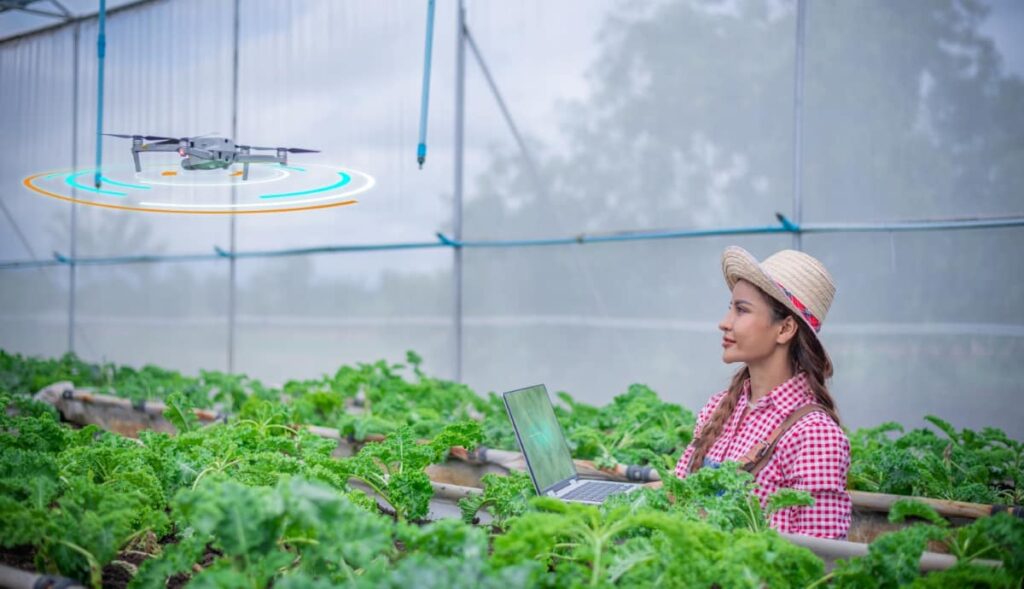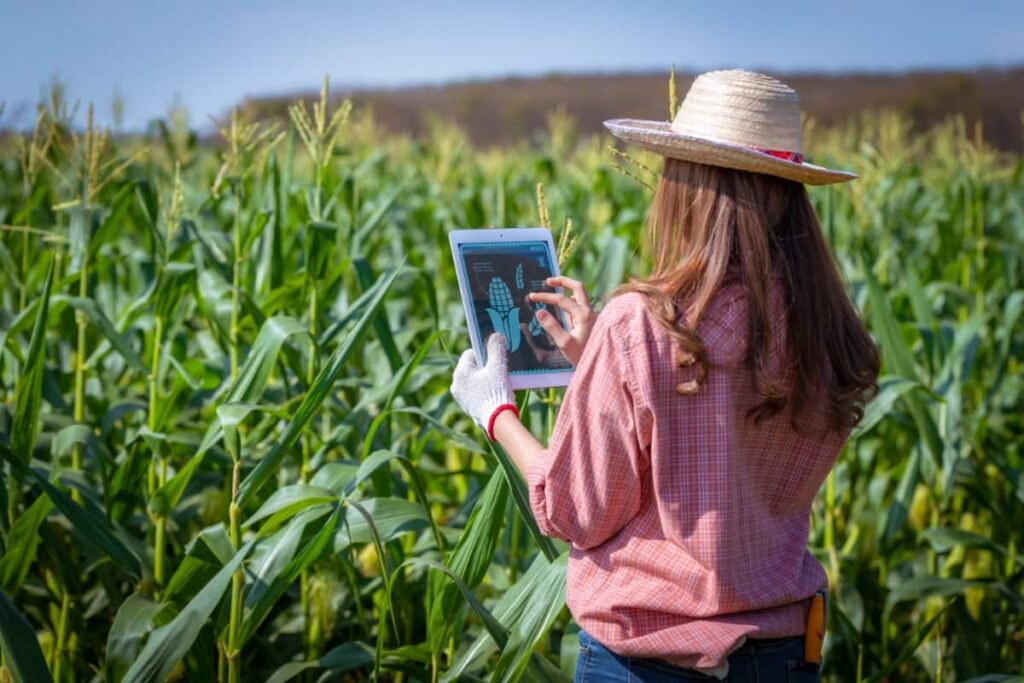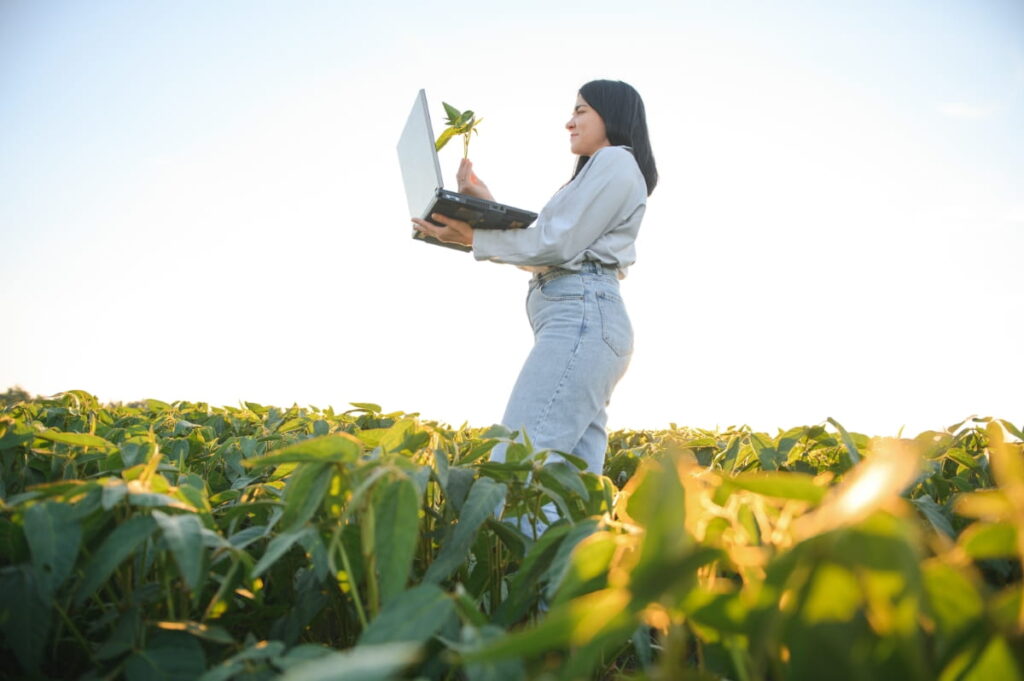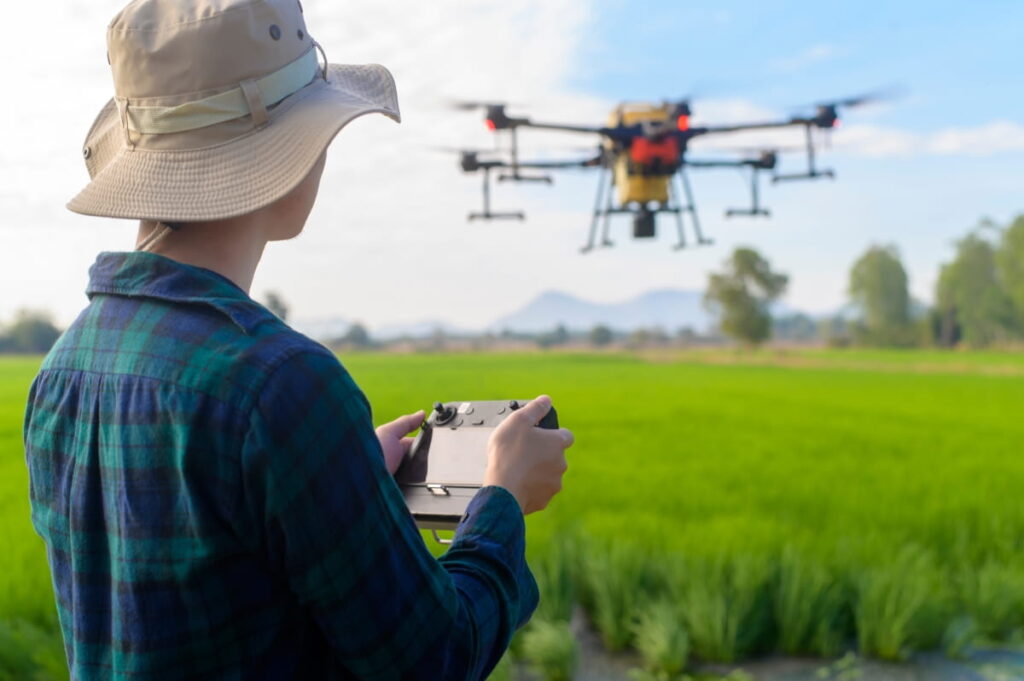Crop monitoring and health assessment can now be done with exceptional accuracy using AI algorithms that analyze data from drones or sensors. With AI technology, farmers can now harness data-driven insights to optimize their operations and maximize yields. From precision agriculture techniques to automated weeding and pest control, AI tools offer a plethora of benefits for modern-day farmers.

Ways in Which Farmers Can Use AI Tools
Precision Agriculture
Precision agriculture is the way farmers approach crop cultivation. By utilizing AI tools, farmers can analyze data to tailor their farming practices to specific areas within their fields. This targeted approach allows for optimized resource allocation and increased productivity. Through precision agriculture, farmers can employ techniques such as GPS mapping and sensors to monitor factors like soil moisture levels and nutrient content in real time.
AI-powered drones are also being used in precision agriculture to capture detailed aerial imagery of fields. This imagery helps identify issues like pest infestations or nutrient deficiencies early on, allowing for prompt intervention before significant damage occurs.
Crop Monitoring and Health Assessment
AI tools have revolutionized the way farmers can monitor their crops, from monitoring growth patterns to detecting early signs of disease or stress. With the help of AI, farmers can analyze data collected from sensors, drones, and satellites to pinpoint areas that require immediate attention.
By knowing issues early on, farmers can take proactive measures to ensure optimal crop health and maximize yields. AI algorithms can provide real-time insights into plant nutrition levels, water requirements, and overall crop vitality. This allows farmers to make decisions regarding irrigation schedules, fertilization strategies, and pest management practices.
Livestock Management and Monitoring
Farmers can now more efficiently track their animals’ health and behavior. By utilizing sensors and data analytics, they can monitor factors like feeding patterns and movement and even detect signs of illness early on. AI technology enables farmers to have real-time insights into their livestock’s well-being, allowing for prompt intervention when necessary.
This proactive approach not only improves animal welfare but also enhances overall farm productivity. Moreover, AI-driven systems can analyze vast amounts of data to predict optimal breeding times or identify patterns that indicate potential health issues. This level of precision empowers farmers to make informed decisions that ultimately benefit both the animals and the business as a whole.
Automated Weeding and Pest Control
AI-powered systems can use precision spraying techniques to identify and target specific weeds without harming surrounding crops. This not only saves time but also reduces the need for excessive pesticide use. When it comes to pest control, AI sensors can detect early signs of infestation, allowing farmers to take measures before significant damage occurs.
In case you missed it: State Specific Schemes for Farmers in India

By utilizing drones equipped with thermal cameras or smart traps, farmers can monitor their fields more efficiently. These automated solutions not only streamline operations but also contribute to sustainable practices by minimizing chemical usage and maximizing crop yield potential.
Yield Prediction and Crop Optimization
By analyzing data such as soil health, weather patterns, and historical yield data, these tools can provide insights into expected harvests. By fine-tuning these factors based on AI predictions, farmers can maximize their yields while minimizing resource waste. AI algorithms can also help identify areas within fields that may need special attention or interventions to improve productivity. Crop optimization through AI technology offers a more efficient and sustainable way for farmers to manage their operations.
Soil Health and Management
Farmers can now use AI tools to monitor and manage their soil health more effectively than ever before. By utilizing sensors and data analytics, they can access real-time information about nutrient levels, pH balance, and moisture content in the soil. AI technology helps farmers make informed decisions about when to irrigate, fertilize, or rotate crops based on their soil’s specific needs.
This targeted approach not only improves crop yield but also reduces environmental impact by minimizing input waste. Moreover, AI can analyze soil data over time to predict trends and potential issues before they arise. By identifying areas that may be at risk for erosion or depletion, farmers can take proactive measures to maintain soil fertility and sustainability.
Climate and Weather Prediction Models
AI tools have revolutionized the way climate and weather prediction models are utilized in agriculture. These models can forecast temperature changes, rainfall patterns, and other crucial environmental factors that impact crop growth. This information helps farmers plan irrigation schedules, adjust planting times, and implement pest control strategies effectively.
With real-time monitoring capabilities, AI tools enable farmers to stay ahead of unexpected weather events such as storms or droughts. By receiving timely alerts and recommendations, they can protect their crops from potential damage and minimize losses.
Supply Chain and Inventory Management
These tools help farmers efficiently track their products from soil to harvest. By utilizing AI algorithms, farmers can optimize their inventory levels, reduce waste, and improve overall productivity. AI technology allows for real-time monitoring of stock levels, ensuring that farmers always have the right amount of supplies.
In case you missed it: Pradhan Mantri Fasal Bima Yojana Scheme: Guide of Crop Insurance for Farmers

This results in better planning and forecasting for future seasons. AI-driven supply chain solutions can enhance traceability throughout the production process. These tools track seeds and fertilizers and monitor crop growth stages, providing valuable insights that contribute to sustainable farming practices.
Farm Management Software and Analytics
With these tools, farmers can streamline tasks like inventory tracking, financial planning, and equipment maintenance. They can also analyze data collected from various sources on the farm, such as sensors and drones, to make informed decisions and increase efficiency. These software solutions provide real-time insights into crop yields, soil health, and weather patterns, allowing farmers to adjust their practices accordingly for optimal results.
Additionally, predictive analytics help forecast market trends and plan production schedules effectively. With the integration of AI technology, farm management has become more precise and data-driven than ever before. Farmers can now monitor every aspect of their operation remotely through mobile apps or desktop interfaces. This level of control enables them to maximize productivity while minimizing costs.
Agricultural Robotics and Automation
From planting seeds to harvesting crops, robots and automated machinery are changing the face of agriculture. These technologies not only increase efficiency but also reduce labor costs and minimize human error. By incorporating AI tools into robotics, farmers can further enhance productivity and streamline operations on the farm.
In case you missed it: Drip Fertigation in Flower Crops: A Practical Guide for Floriculture Farmers

AI tools will transform the agricultural industry. With advancements in technology solutions, farmers can optimize their processes, improve crop yields, and ensure sustainable practices for years to come. Embracing these intelligent tools will benefit individual farmers and contribute to global food security and environmental conservation efforts.
Conclusion
The integration of AI into agricultural practices not only enhances efficiency but also promotes sustainability by optimizing resource usage and maintaining soil health. Climate prediction models powered by AI help mitigate risks associated with weather fluctuations while ensuring optimal growing conditions for crops. It becomes evident that the future of farming lies in the hands of innovative technologies that continue to revolutionize the way we cultivate our lands.
- Irrigation and Water Management in Pineapple Farming
- Blossom to Harvest: Mastering Flowering and Pollination in Papaya Farming
- Pig Fattening Essentials: From Selection to Sale for Beginners
- Raising Wagyu Cattle: A Complete Guide for Premium Beef Production
- Soil Types and Their Water Holding Capacity
- Optimizing Irrigation Schedules for Coconut Groves for Enhanced Yield
- Espresso Your Garden: Coffee Grounds for Healthier Acid-Loving Plants
- The Best Soil Mix for Snake Plants: How to Mix Your Own Snake Plant Soil
- Green Thumb Success: Expert Tips for Cultivating Greenhouse Beans All Year Round
